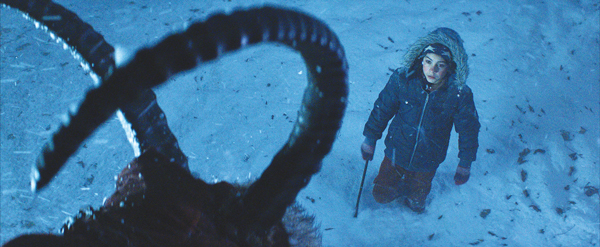By John Mulderig
NEW YORK (CNS) – Holiday horror reigns in the movie “Krampus” (Universal), the story of how one suburban family’s strident quarreling not only quashes the true spirit of Christmas, but unleashes Santa’s evil counterpart as well.

As this mythical monster, drawn from Alpine folklore, pursues his goal of annihilating the naughty, mature viewers will be drawn into a nightmarish world of chaotic logic from which they’ll emerge with only scanty rewards.
That’s not to say that in crafting his script with co-writers Todd Casey and Zach Shields, director Michael Dougherty didn’t have his heart in the right place. While avoiding any direct reference to Christianity, he successfully skewers the materialism that mars the season and promotes unity and self-sacrifice in the face of danger.
But such values seem to be checked off by rote. Partly that’s a consequence of sloppy characterizations and the shorthand portrayal of relationships. But the screenplay also suffers from the obvious limits of Hollywood’s generic – and therefore insubstantial – substitute for religion.
We’re shown the disastrous consequences of abandoning belief and surrendering hope. But belief in – and hope for – what, exactly?
Only those willing to see the presence of the real St. Nicholas in the background of this often haphazard frightfest as a tenuous lifeline connecting moviegoers to a genuine – if half-forgotten – form of faith may grope their way along toward solid footing.
Some shadowy version of the fourth-century bishop of Myra does seem to inhabit the imagination of the film’s protagonist, innocent preteen Max (Emjay Anthony). His trust in St. Nick – inherited from and shared with his good-hearted but melancholy German granny (Krista Stadler) – is a source of comfort for the lad as he copes with the unsettling dysfunction that surrounds him.
Max’s parents, Tom (Adam Scott) and Sarah (Toni Collette), have allowed the demands of daily life to drain away their love for each other. His older sister, Beth (Stefania Lavie Owen), prefers the company of her stoner boyfriend to that of her relatives. And the Advent-tide arrival of houseguests in the form of more distant kin only makes things worse.
Max’s Uncle Howard (David Koechner) is a gun-loving, red-state lout straight from central casting, while Howard’s wife, Linda (Allison Tolman), is the ineffectual matriarch of three nasty kids (Lolo Owen, Queenie Samuel and Maverick Flack). Another aunt, Dorothy (Conchata Ferrell), seems never to have met a cocktail she didn’t like – or a person she did.
Mocked by his odious cousins, and frustrated by his family’s disarray, Max is driven to renounce his faith in Santa by tearing up his annual letter to the gift giver. The result is a blizzard of epic proportions in which Beth soon becomes lost – and that traps the remainder of the ensemble inside. There they make easy prey for the marauding Anticlaus and his minions, the latter typified by a host of malignant gingerbread men.
Max’s trashed note can be read as a sort of prayer in which he requests good for all around him: reconciliation for his parents, restored closeness between him and Beth, even better things for cash-strapped Howard and Linda. And there’s more than a little theological insight in his grandmother’s remark that “St. Nick is what you make of him.”
In fact, Catholic moviegoers of a certain bent may be tempted to see in Stadler’s character – who is known to one and all by the Teutonic diminutive Omi – a kind of homespun, female version of retired Pope Benedict XVI. Omi, who blesses herself at one scary turn, just to let us know she’s Catholic, watches with forlorn dismay as the misguided people around her enable evil and bring their world to ruin. Whether the former pontiff would indulge in the same twinkling of the eye by which Omi appears to say, “I told you so,” however, is another matter.
Such exalted musings can’t entirely make up for the fact that the picture’s good intentions are largely lost once the title fiend’s retribution begins to be distributed in a loud and lurid manner. By then, viewers may begin to empathize with some characters who eventually try to escape the death house, only to find themselves trudging through resistant snow.
The film contains brief gory images, considerable stylized violence, a visual drug reference, about a half-dozen uses of profanity, a single rough term and occasional crude and crass language. The Catholic News Service classification is A-III – adults. The Motion Picture Association of America rating is PG-13 – parents strongly cautioned.
